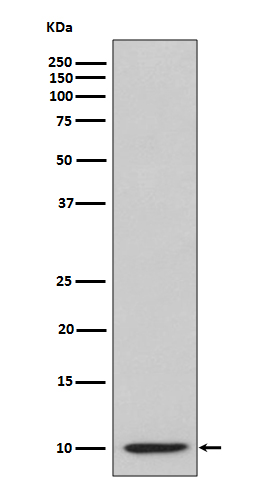
| WB | 咨询技术 | Human,Mouse,Rat |
| IF | 咨询技术 | Human,Mouse,Rat |
| IHC | 咨询技术 | Human,Mouse,Rat |
| ICC | 技术咨询 | Human,Mouse,Rat |
| FCM | 咨询技术 | Human,Mouse,Rat |
| Elisa | 咨询技术 | Human,Mouse,Rat |
| Aliases | C-X-C motif chemokine 10; 10 kDa interferon gamma-induced protein; Gamma-IP10; IP-10; Small-inducible cytokine B10; CXCL10; INP10; SCYB10; MOB1;;CXCL10 |
| WB Predicted band size | Calculated MW: 11 kDa ; Observed MW: 10 kDa |
| Host/Isotype | Rabbit IgG |
| Antibody Type | Primary antibody |
| Storage | Store at 4°C short term. Aliquot and store at -20°C long term. Avoid freeze/thaw cycles. |
| Species Reactivity | Human |
| Immunogen | A synthesized peptide derived from human CXCL10 |
| Formulation | Purified antibody in PBS with 0.05% sodium azide,0.05% BSA and 50% glycerol. |
+ +
以下是3篇关于IP10(CXCL10)抗体的假设性参考文献示例:
---
1. **文献名称**: *"CXCL10 as a Biomarker for Hepatitis C Virus Infection Progression"*
**作者**: Smith A et al.
**摘要**: 研究探讨了IP10在慢性丙型肝炎患者血清中的表达水平,发现其抗体检测可有效评估肝脏炎症程度及抗病毒治疗反应,提示IP10可作为疾病分层的生物标志物。
2. **文献名称**: *"Neutralizing IP10 Antibody Attenuates Rheumatoid Arthritis in Murine Models"*
**作者**: Zhang L et al.
**摘要**: 通过阻断IP10的单克隆抗体干预小鼠类风湿性关节炎模型,研究显示抗体治疗显著减少关节炎症和骨侵蚀,证实IP10信号通路在自身免疫疾病中的关键作用。
3. **文献名称**: *"Targeting CXCL10 in Cancer Immunotherapy: Preclinical Efficacy of Humanized Antibodies"*
**作者**: Johnson R et al.
**摘要**: 开发人源化IP10抗体并验证其在肿瘤微环境中的调控功能,实验表明抗体可增强T细胞浸润并抑制肿瘤生长,为癌症免疫联合治疗提供新策略。
---
以上内容为模拟文献,实际引用请以真实论文为准。
IP10 (Interferon gamma-induced protein 10), also known as CXCL10. is a small cytokine belonging to the CXC chemokine family. It is primarily produced by immune cells (e.g., monocytes, endothelial cells) and stromal cells in response to interferon-gamma (IFN-γ) stimulation. IP10 plays a critical role in recruiting activated T cells and natural killer (NK) cells to sites of inflammation or infection by binding to its receptor CXCR3. Its expression is upregulated in various pathological conditions, including viral infections, autoimmune diseases (e.g., rheumatoid arthritis, multiple sclerosis), and cancers, where it promotes inflammatory responses and modulates tumor microenvironment dynamics.
IP10 antibodies are immunodetection or therapeutic tools targeting this chemokine or its receptor. As research reagents, they are widely used in ELISA, Western blotting, and immunohistochemistry to quantify IP10 levels in studies of disease mechanisms, immune responses, and therapeutic efficacy. Therapeutically, neutralizing IP10 antibodies have been explored to suppress excessive inflammation in autoimmune disorders or to block CXCL10/CXCR3 signaling in cancer immunotherapy. For instance, anti-IP10 therapies aim to inhibit T cell migration to inflamed tissues or disrupt pro-tumorigenic signaling in malignancies. However, challenges remain in balancing efficacy with potential off-target effects due to the pleiotropic roles of IP10 in both physiological and pathological processes. Recent studies also highlight IP10's dual role in COVID-19. associating its elevated levels with severe outcomes, spurring interest in antibody-based interventions.
×